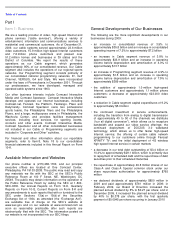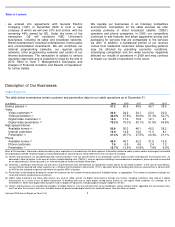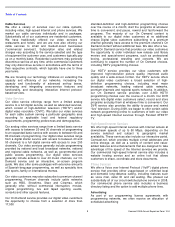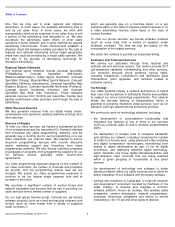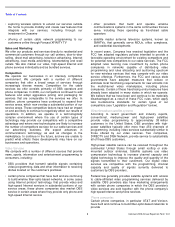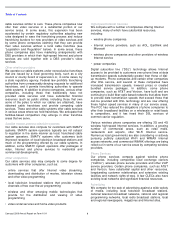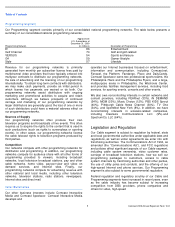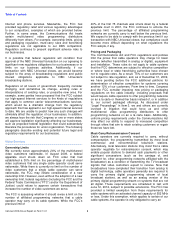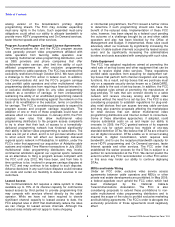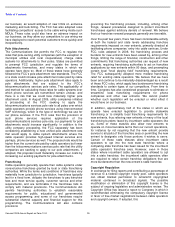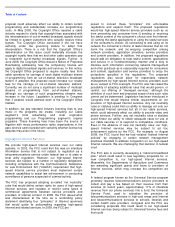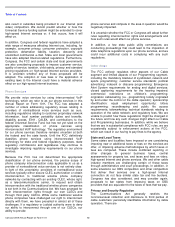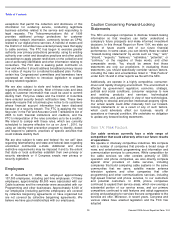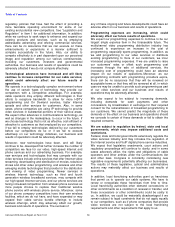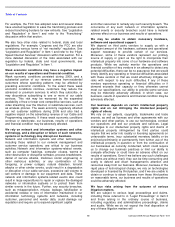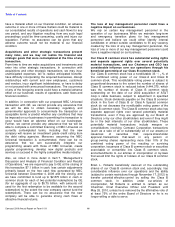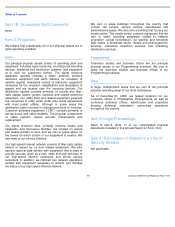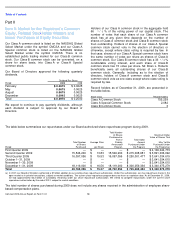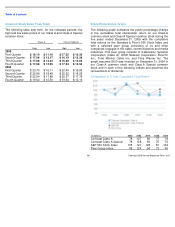Comcast 2009 Annual Report Download - page 15
Download and view the complete annual report
Please find page 15 of the 2009 Comcast annual report below. You can navigate through the pages in the report by either clicking on the pages listed below, or by using the keyword search tool below to find specific information within the annual report.
Table of Contents
Comcast 2009 Annual Report on Form 10-K
10
our business, as would adoption of new limits on exclusive
marketing and bulk billing. The FCC has also adopted rules
facilitating competitors’ access to the cable wiring inside such
MDUs. These rules could also have an adverse impact on
our business, as they allow our competitors to use wiring we
have deployed to reach potential customers more quickly and
inexpensively.
Pole Attachments
The Communications Act permits the FCC to regulate the
rates that pole-owning utility companies (with the exception of
municipal utilities and rural cooperatives) charge cable
systems for attachments to their poles. States are permitted
to preempt FCC jurisdiction and regulate the terms of
attachments themselves, and many states in which we
operate have done so. Most of these states have generally
followed the FCC’s pole attachment rate standards. The FCC
or a state could increase pole attachment rates paid by cable
operators. Additionally, higher pole attachment rates apply to
pole attachments that are subject to the FCC’s
telecommunications services pole rates. The applicability of
and method for calculating those rates for cable systems over
which phone services are transmitted remain unclear, and
there is a risk that we could face materially higher pole
attachment costs. In August 2009, utility companies initiated
a proceeding at the FCC seeking to apply the
telecommunications services pole rate to all poles over which
cable operators provide phone services using interconnected
VoIP technology, which is the type of technology we use for
our phone services. If the FCC rules that the provision of
such phone services requires application of the
telecommunications services pole rate, our payments for pole
attachments would increase significantly. In addition to the
utility company proceeding, the FCC separately has been
considering establishing a new unified pole attachment rate
that would apply to cable system attachments where the
cable operator provides high-speed Internet services and,
perhaps, phone services as well. The proposed rate would be
higher than the current rate paid by cable operators but lower
than the telecommunications services pole rate that the utility
companies are seeking to apply to our pole attachments. If
adopted, this proposal could materially increase our costs by
increasing our existing payments for pole attachments.
Franchising
Cable operators generally operate their cable systems under
nonexclusive franchises granted by local or state franchising
authorities. While the terms and conditions of franchises vary
materially from jurisdiction to jurisdiction, franchises typically
last for a fixed term, obligate the franchisee to pay franchise
fees and meet service quality, customer service and other
requirements, and are terminable if the franchisee fails to
comply with material provisions. The Communications Act
permits franchising authorities to establish reasonable
requirements for public, educational and governmental
access programming, and some of our franchises require
substantial channel capacity and financial support for this
programming. The Communications Act also contains
provisions
governing the franchising process, including, among other
things, renewal procedures designed to protect incumbent
franchisees against arbitrary denials of renewal. We believe
that our franchise renewal prospects generally are favorable.
Over the past few years, there has been considerable activity
at both the federal and state levels addressing franchise
requirements imposed on new entrants, primarily directed at
facilitating phone companies’ entry into cable services. Under
FCC rules adopted in 2006, the franchising process and
burdens for new entrants have been eased by, among other
things, limiting the range of financial, construction and other
commitments that franchising authorities can request of new
entrants, requiring franchising authorities to act on franchise
applications by new entrants within 90 days, and preempting
certain local “level playing field” franchising requirements.
The FCC subsequently adopted more modest franchising
relief for existing cable operators. We believe that we have
been and continue to be materially disadvantaged as a result
of these FCC rules, which apply less burdensome franchising
standards to certain types of our competitors. From time to
time, Congress has also considered proposals to eliminate or
streamline local franchising requirements for phone
companies and other new entrants. We cannot predict
whether such legislation will be enacted or what effect it
would have on our business.
In addition, approximately half of the states in which we
operate have enacted legislation to provide statewide
franchising or to simplify local franchising requirements for
new entrants, thus relieving new entrants of many of the local
franchising burdens faced by incumbent cable operators like
us. Some of these statutes also allow new entrants to
operate on more favorable terms than our current operations,
for instance by not requiring that the new entrant provide
service to all parts of the franchise area or permitting the new
entrant to designate only those portions it wishes to serve.
Certain of these state statutes allow incumbent cable
operators to opt into the new state franchise where a
competing state franchise has been issued for the incumbent
cable operator’s franchise area. However, even in those
states where incumbent cable operators are allowed to opt
into a state franchise, the incumbent cable operators often
are required to retain certain franchise obligations that are
more burdensome than the new entrant’s state franchise.
Copyright Regulation
In exchange for filing reports and contributing a percentage of
revenue to a federal copyright royalty pool, cable operators
can obtain blanket permission to retransmit copyrighted
material contained in broadcast signals. The possible
modification or elimination of this copyright license is the
subject of ongoing legislative and administrative review. The
Copyright Office has issued a report to Congress in which it
recommended eliminating the compulsory copyright license
in favor of free market negotiations between cable operators
and copyright owners. If adopted, this


